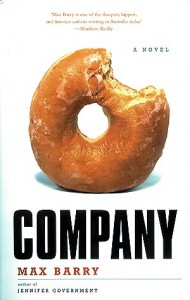 Jones is a new hire at Zephyr Holdings, a company in Seattle. His very first task upon arriving at the office is to find out who ate his boss’s donut. From there, Jones begins a quest to find out exactly what it is this company he works for does. I mean, what is their business. The answer is both surprising and a bit unsettling.
Jones is a new hire at Zephyr Holdings, a company in Seattle. His very first task upon arriving at the office is to find out who ate his boss’s donut. From there, Jones begins a quest to find out exactly what it is this company he works for does. I mean, what is their business. The answer is both surprising and a bit unsettling.
Company is the third book I’ve read by Max Barry (Jennifer Government and Syrup being the other two). Company follows right on the heels of the others, exploring the relationship between the corporate world and everyday life. In Company, Barry focuses on the employees, the worker-bees in any corporation, and their role in the company’s successes and failures. In particular, he examines how the different aspects of the company — marketing, IT, procurement, etc — work together — or don’t — for the betterment of the company. But, he also explores how corporate culture demands personal sacrifice from the employees in order to maximize corporate success.
Barry explores corporate culture by taking it to absurd extremes — or, at least, I hope he does. I can’t imagine working in an environment that he describes. At the same time, while reading Company, I couldn’t help but think that “that’s a lot like where I work.” For example, regarding the different organizations in the company and their relationships to one another, I’ve often thought that there must be someone where I work who’s sole job is to make up new forms, just so I have new ones to fill out. Not because it leads to more productivity, or makes it easier to do my job, but just because. Just because someone has a job to make forms.
By lampooning corporate culture, Barry exposes some of the trends that are really disturbing once you think about them. I won’t go into details because I think it would spoil the plot, but suffice it to say that by painting corporate life in an absurd extreme, Barry offers insight into just how corporate culture is affecting us, both as individuals and as a society.
I really enjoyed the novel and highly recommend it, both for its entertainment value and its perspective on our market-driven society. I’d really like to hear what people who are in large, multinational corporations think about this book. Barry himself used to work at HP. Any HPeons out there willing to give their thoughts?